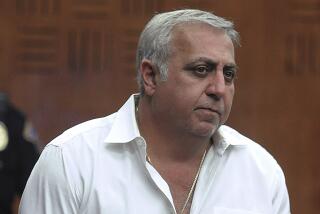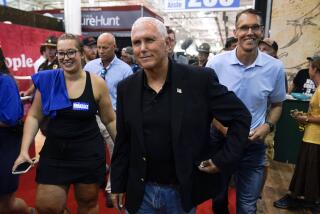Inquiry Expanded to Include Meese’s Actions as Atty. Gen.
- Share via
WASHINGTON — A special prosecutor’s investigation into Edwin Meese III’s activities while a White House counselor has now widened to activities since he has been attorney general.
Investigators are looking into Meese’s activities in connection with a friend’s effort to secure government backing for an Iraqi pipeline project, sources close to the inquiry said Thursday night.
The sources, who spoke on condition they not be identified, said investigators for special prosecutor James McKay have been questioning several people recently about the involvement of Meese’s friend, E. Robert Wallach, in the Iraqi pipeline project.
Over the last few weeks, investigators have heard testimony about the relationship between Meese and Wallach, a San Francisco lawyer who has acted in the past as Meese’s attorney and adviser.
The investigators are trying to determine whether Meese introduced Wallach to U.S. officials in connection with the pipeline project in 1985, the sources said. Meese became attorney general in March of that year.
Wallach was trying to obtain American government backing and funds for an Iraqi pipeline project in which Wallach had a commercial interest, the sources said.
The expanded investigation appears to be focusing on whether Wallach improperly influenced government officials to support the pipeline project by invoking Meese’s authority, and whether Meese approved these efforts.
There is no evidence that Meese had any financial stake in the project himself, the sources said.
Wallach told the New York Times through a lawyer that he would not comment while the investigation was going on but that he had done nothing wrong. Aides to Meese and McKay also had no comment.
The newspaper said in today’s editions that a number of former senior Reagan Administration officials, who asked not to be identified, have said they recently told McKay’s investigators that Wallach had pressed them to support the pipeline project.
Was Meese Name Invoked?
One matter said to be under investigation is whether, in October, 1985, Wallach invoked Meese’s name and pressed a deputy assistant attorney general in the department’s Office of Legal Counsel, Allan Gerson, for a favorable ruling on the pipeline project, the newspaper said.
The ruling, crucial to the fate of the project, dealt with whether congressionally appropriated aid money for Israel could be used as a financial guarantee for the pipeline. After Justice Department lawyers said the funds could not be used that way, the project died.
Some of the witnesses have told McKay that they were unaware Wallach had a stake in the pipeline at a time when he was pressing the case for the project and presenting himself as speaking for Meese or for the National Security Council, the newspaper said. This omission, they told investigators, raised ethical questions.
McKay is already investigating whether Meese’s dealings with Wedtech Corp., while White House counselor, violated conflict-of-interest laws. Wallach, who was hired by the Bronx, N.Y.-based company as a consultant, asked Meese to review the company’s bid for a defense contract.
Meese directed his staff to review the proposal and to make sure the company received a hearing from the Army, which opposed the bid.
Wedtech won the no-bid contract as a minority business.
More to Read
Get the L.A. Times Politics newsletter
Deeply reported insights into legislation, politics and policy from Sacramento, Washington and beyond. In your inbox twice per week.
You may occasionally receive promotional content from the Los Angeles Times.










